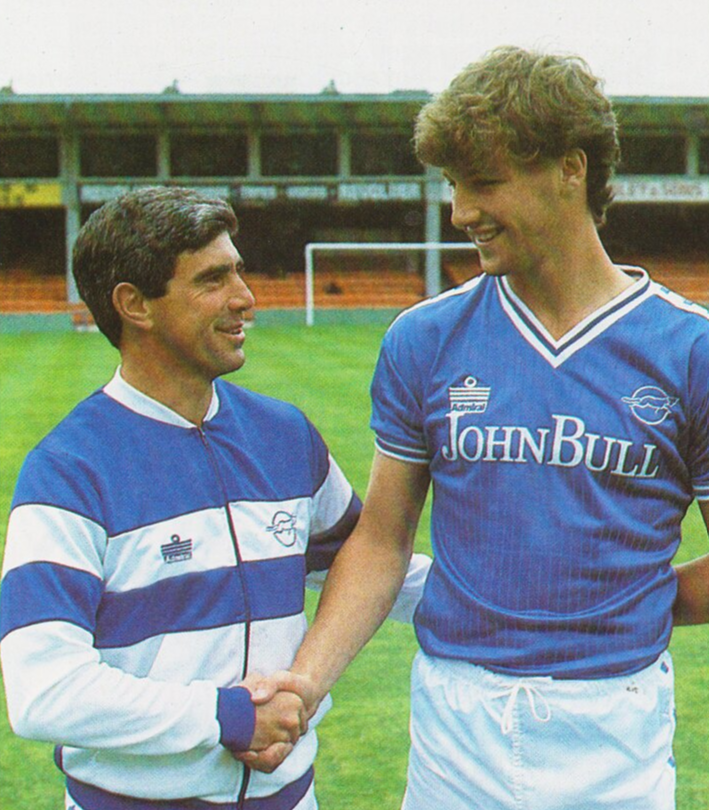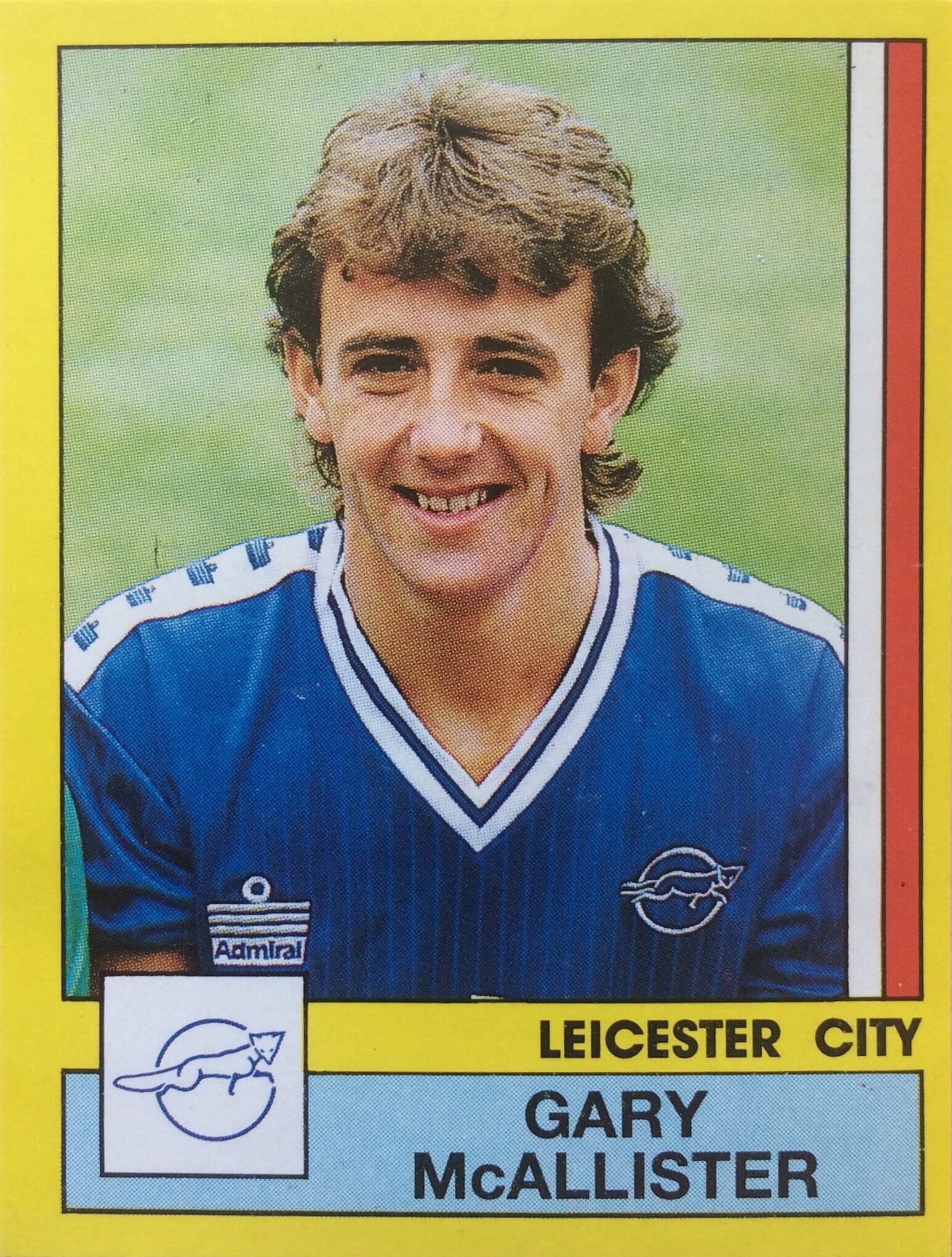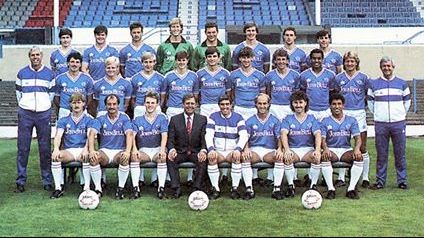Leicester City v Wimbledon, 1987
Leicester City welcomed Wimbledon for the first time in February 1987, as the two clubs met at Filbert Street. The Dons had been a league club for less than a decade, and were enjoying their debut season in English football’s top flight.

Leicester were experimenting with a new management structure. Former Northern Ireland international Bryan Hamilton arrived at Filbert Street from Wigan in the summer of 1986 as Gordon Milne, in charge since the departure of Jock Wallace in 1982, moved ‘upstairs’. With shared managerial duties during the 1986-87 season, Milne was designated General Manager and Hamilton took charge of the team. At Wimbledon, Dave Bassett was at the helm. A player in the club’s Southern League days and their first Football League season, Bassett had served as assistant manager to Dario Gradi since 1978. He took over as manager when Gradi left for Crystal Palace in January 1981, with Wimbledon a Fourth Division club, and oversaw the club’s dramatic rise to the First Division.
Though not two of English football’s glamour clubs, both teams fielded some notable players. Leicester, with Northern Ireland internationals John O’Neill and Paul Ramsey in their starting line-up, also featured future international players and league title winners. Gary McAllister had joined from Motherwell in 1985, later becoming a Scottish international and a 1991-92 First Division Champion with Leeds; signing for Liverpool from Coventry at age 35, he won a string of cups in two years at Anfield. Striker Alan Smith was signed from non-league Alvechurch to partner Gary Lineker in 1982, and after Lineker’s transfer to Everton was the club’s main goalscorer. Signed by Arsenal for £825,000 in March 1987, Smith was allowed to stay until the end of the season; at Highbury he was an England international, league and cup winner, with only one booking in his career.


Long-serving midfielder Ian Wilson, a substitute in this game, broke into the Scotland team at the end of the season but was signed by Everton in a surprise £300,000 move in September 1987. Centre-half Steve Walsh had followed Hamilton from Wigan for £100,000 in summer 1986 and stayed at Leicester for 14 years. In contrast to Smith, Walsh jointly holds the Football League record for career sending-offs (13, with Roy McDonough).
Several of the Wimbledon side were also to receive future international caps, but most were to be with other clubs, as their success attracted the attention of richer First Division outfits. When Bassett left for Watford at the end of the 1986-87 season to replace Graham Taylor, an exodus of their top players began. Nigel Winterburn was soon snapped up by Arsenal for £400,000 as a long-term replacement for England left-back Kenny Sansom. Glyn Hodges left for Newcastle that summer, to be followed a year later by Dave Beasant and Andy Thorn, while Brian Gayle joined Manchester City. Eventually club talismans Vinny Jones (1989-Leeds) and Dennis Wise (1989-Chelsea) also departed. While Hodges and Jones were Welsh internationals, Beasant, Winterburn and Wise all received full England recognition after leaving Wimbledon.


Milne left Leicester at the end of the season, and David Pleat took over from Hamilton as manager in December 1987. Hamilton returned to Wigan (1989-93), before a stint in charge of Northern Ireland between 1994 and 1998. His final managerial post to date was at Norwich City in 2000. While his successor Bobby Gould went on to win the 1988 FA Cup with Wimbledon, Bassett’s time at Watford only lasted until January 1988 with the club facing relegation. His longest stay after Wimbledon was at Sheffield United (1988-95), while his later managerial roles included Crystal Palace, Nottingham Forest, Barnsley and Leicester.
Match details for Leicester City – Wimbledon; Filbert Street, Football League Division One, Saturday 7 February 1987:
Leicester City: 1. Ian Andrews, 2. Alistair Mauchlen, 3. Simon Morgan, 4. John O’Neill, 5. Steve Walsh, 6. Gary McAllister, 7. Steve Lynex, 8. Steve Moran, 9. Alan Smith, 10. Paul Ramsey, 11. Mark Venus (sub. Ian Wilson). Manager: Bryan Hamilton. Scorers: Smith, Ramsey 2.
Wimbledon: 1. Dave Beasant, 2. John Kay (sub. Dennis Wise), 3. Nigel Winterburn, 4. Vinny Jones, 5. Brian Gayle, 6. Andy Thorn, 7. Glyn Hodges, 8. Andy Sayer, 9. Alan Cork, 10. Lawrie Sanchez, 11. Carlton Fairweather. Manager: Dave Bassett. Scorer: Fairweather. Sent Off: Thorn.
Attendance: 8,369


This win lifted Leicester out of the relegation zone into 18th place; Wimbledon were then 11th but eventually climbed to an impressive 6th place. While Wimbledon’s rise since their election to the Football League in 1977 had been spectacular, their uncompromising style of play and disciplinary record that year – 56 bookings and 6 sendings-off – made them difficult and often unpopular opponents in the First Division. Meanwhile Leicester were relegated, finishing in 20th – just two points short of Charlton and a place in the first promotion/relegation play-offs.
In an era when English football was still suffering from decrepit stadia, economic downturn and hooliganism, even at the top level many clubs struggled to attract big crowds. This was not the only sub-10,000 crowd at Filbert Street; over the 1986-87 season, four clubs recorded a lower average in the top flight than Leicester’s 11,697. One of them was Wimbledon, the smallest club to reach the First Division, posting the lowest attendances with an average of 7,810 at Plough Lane – the ground they eventually returned to in 2020.
It was to be 1994 before Leicester made it back to the top flight, and in 2002 they left Filbert Street for the Walkers (now King Power) Stadium, where they are currently enjoying great success. Wimbledon remained a top-division side until 2000. The club’s tumultuous recent history continued with their sad demise, rebirth and eventual return to the league as AFC Wimbledon – a story recounted by Erik Samuelson in his book All Together Now.


The state of the Football League in the 1980s is one of the topics in my book Before the Premier League: A History of the Football League’s Last Decades.